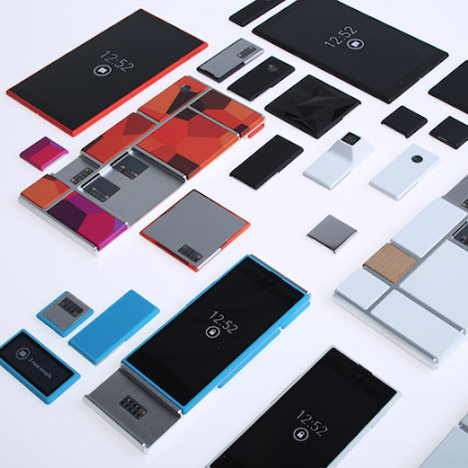News: Google-owned communications company Motorola is working with Design Academy Eindhoven graduate and Phonebloks creator Dave Hakkens to develop open-source modular mobile phones.
Yesterday Motorola revealed on its blog that it has been working for a year on a scheme named Project Ara, a "free, open hardware platform for creating highly modular smartphones," which will allow users to develop, swap and replace modules for their phones to create customised handsets.
"We want to do for hardware what the Android platform has done for software: create a vibrant third-party developer ecosystem, lower the barriers to entry, increase the pace of innovation, and substantially compress development timelines," Motorola Advanced Technology and Projects group leader Paul Eremenko said.
The phones will comprise a structural base frame and modules that lock on to it, which could include an extra battery, additional screen or keyboard.
Motorola also announced it has teamed up with design graduate Dave Hakkens, who developed his Phonebloks concept for a modular phone where mix-and-match components clip onto a central board while studying at Design Academy Eindhoven and saw his idea go viral earlier this month.
"My idea succeeded from day one; I got a lot of responses to it," Hakkens told Dezeen at the preview of the academy graduate show during Dutch Design Week earlier this month. "I've got a lot of people interested in developing it: engineers, technicians and companies."
Hakkens' video demonstrating his concept received over 16 million views on Youtube and Phoneblocks has almost a million supporters online.
"We've done deep technical work. Dave created a community. The power of open requires both," said Eremenko.
Motorola hopes to share its technical development work with Hakkens' widespread social media communities and will be releasing a developers' kit this winter, so people can begin designing their own components for the phones.
Using volunteers known as Project Ara research scouts, Motorola will continue to develop the idea in a similar way to how Google trialled its voice-controlled wearable Google Glass technology, where the public was asked to try out the headset then offer feedback on the hardware and its features.
The move from Motorola follows on from its project called Sticky, where the company took a van full of hackable Motorola phones and 3D-printing equipment to top tech universities including MIT and Caltech for a series of experimental workshops.
"On that trip we saw the first signs of a new, open hardware ecosystem made possible by advances in additive manufacturing and access to the powerful computational capabilities of modern smartphones," Eremenko said. "These included new devices and applications that we could never have imagined from inside our own labs."
Read a full interview with Dave Hakkens in our earlier story.

